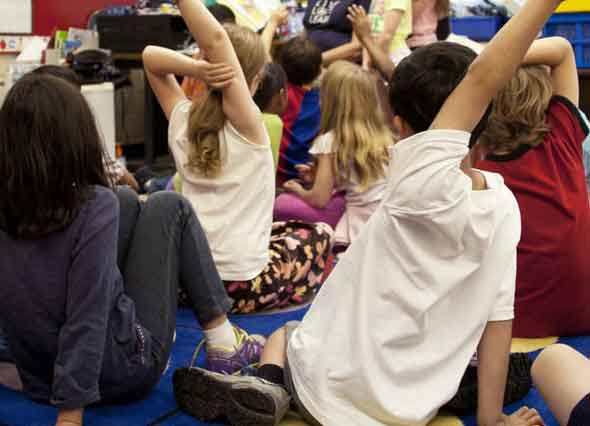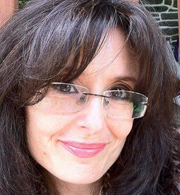
Any woman who was ever a girl who had not yet gotten her period knows that book, and can remember all of the emotions triggered by the diary entries of this mid-to-late 20th century adolescent.
The thing I most remember about the book is not so much what was inside the covers, but what I had to go through to get the copy. Apparently, the sixth-graders at Merion Mercy Academy were pretty cheap, because when I say "get the copy," that's exactly what I mean.
There was only one book floating around the classroom, and you needed to put your name on a list to have access to Blum's words of wisdom. I was so far down on that list, there was a possibility I'd go through menopause before reading about what would happen when I got my period. It apparently never occurred to the girls in Mrs. Osertag's class to just buy another copy.
But I digress.
The fact that we had to sign our names on a list, and then share the book surreptitiously at the locker or in the lunchroom gives some idea about the culture of children's literature in 1972. I'm pretty sure I wouldn't have had to score a copy of Laura Ingalls' "Wilder: or "Anne of Green Gables" at the corner from some guy named "Fang," but we treated "Are You There G od It's Me Margaret" as if it were contraband. And that's because we were (1) in a Catholic school, (2) a bit prudish and (3) our parents actually loved us.
The first two statements are indisputable. When you spend almost seven hours a day in a uniform and crucifixes stare you down from every classroom wall, you are not going to be talking about feminine hygiene and sexual reproduction openly, especially if you're 11 years old and your parents are paying good money to guarantee, as Billy Joel wrote, that you start much too late.
Then we have the part about our parents loving us. We had mothers and fathers, as well as aunts, uncles and grandparents, who were concerned about what we were putting into our little minds. It wasn't that they wanted to censor the things we were reading, or turn us into miniature/celibate/unmarried Stepford Wives. They'd entrusted us to the care of the Mercy nuns, for lord's sake, the most annoyingly, gloriously independent order of religious in the universe.
But they weren't going to expose us, excuse the pun, to things that were inappropriate for our collective age. "Are You There G od, It's Me Margaret," actually was appropriate, and has become a classic of the coming-of-age genre. I remember reading it with awe and gratitude. I bought my own copy, and it sits in a closet with all of my beloved childhood treasures, packed away but not forgotten.
I thought of the subversive Blum Trafficking Network when I heard about the mother in Fairfax County, Va., who stood up at a school board meeting and read from a book that she was able to check out from the local high school library which included passages about pedophilia, sodomy and other delightful childhood activities.
Stacy Langlon said that she was motivated to investigate the books that were being offered at her school after hearing about the sexual content in other school libraries. One of the books was a graphic novel entitled "Gender Queer" by Maia Kobabe, and the other was "Lawn Boy" by Jonathan Evison. The latter included passages of a man having sex with a boy, and another character masturbating.
When she continued to talk about the content at the open meeting, one of the school officials tried to cut her off, stating that there were children in the audience and her comments were inappropriate.
Imagine that, discussing masturbation, pedophilia and sodomy are age inappropriate. Clearly, there is a dearth of irony among school officials in Fairfax County, Va.
When confronted with this mother's concerns and the events of that school board meeting at the recent Virginia gubernatorial debate, Democratic candidate (and former governor) Terry McAuliffe said this:
"I'm not going to let parents come into schools and actually take books out and make their own decisions. I don't think parents should be telling schools what they should teach."
Aside from handing his Republican challenger a perfect campaign attack ad, McAuliffe accidentally showed the true face of progressives in this society. Hillary Clinton started it innocuously enough when she made her famous "It Takes A Village" quote, and it's no coincidence that McAuliffe is a longtime friend and supporter of the former First Lady/Senator/Presidential Candidate/Secretary of State/Presidential Candidate Again.
But what McAuliffe is suggesting is even more sinister than what Hillary proposed. I happen to agree that it takes a village to keep a child from getting into trouble, as anyone who grew up in Delco or South Philly or West Philly or North Philly could attest. Memories of the old lady next door smacking your butt if you were acting up, and your parents giving her that right, are common.
But McAuliffe is channeling the philosophy of people who think they are the ones who should decide what your kids should wear on their faces, what should be jabbed into their arms and, much more importantly, what should be poured into their malleable, wonderful, open and extremely vulnerable young brains. It's no longer "the hand that rocks the cradle rules the world." It's more like "let's cut off the hand that rocks the cradle, unless it rocks it the way we want."
I remember a few years ago when Haverford Township Library held "Drag Queen Story Time." I wrote about it, and there was considerable pushback from the woke folk who thought that my opposition to having men in makeup and dresses telling fairy tales to toddlers was bigoted, homophobic, and whatever other word was trending on Twitter that day. To be honest, I'd rather have guys in spangles read wholesome stories to little kids than teachers providing heartwarming manuals about sexual deviance under the guise of "inquiry" and "diversity" and "tolerance."
Thinking back on the way Judy Blume's book finally made it into my pre-pubescent hands brings a smile, now, along with a realization that things were so much more innocent in 1972.
And it makes me immensely grateful to that mother in Fairfax County, Va., who had the courage to remind us that the village doesn't own our kids.
(COMMENT, BELOW)
Christine M. Flowers is a lawyer and columnist.


 Contact The Editor
Contact The Editor
 Articles By This Author
Articles By This Author